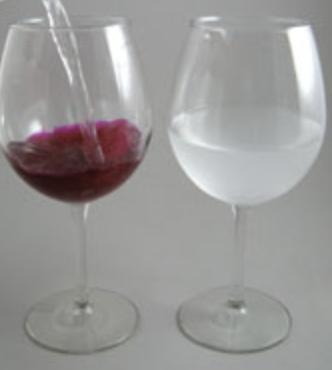
Everyone loves a wedding. But, topically, was this really a wedding party or a works event? Was there cheese? Anyway what’s so important about wine?
Water into Wine?

You might have seen this ‘trick’ shown in churches before. The person has a glass of what seems to be water. However, some Sodium Carbonate, an alkali, has been added to water and has been thoroughly mixed. There’s another glass with, again, what seems to water in it; however, pre-mixed is some pH indicator – which change colour depending whether it is an acidic or alkali solution. Currently in water it is neutral and colourless. When the Sodium Carbonate solution is added, the pH indicator (phenolphthalein in this case) turns red, indicating that you’ve turned water into wine. Please don’t drink it!
The explanation always appears far more boring than watching it!
What a week!
In the passage John 2:1-11 we have Jesus at a wedding in Cana where after they have run out of wine, there’s more wine! But what’s so important about the wine?
It might be good to ignore the wine – just put the glass down – and look at the first few words : “And on the third day…” As we read the Gospel of John from the start we notice that Jesus isn’t portrayed as merely a human but divine from the outset – markedly different to the other or synoptic (seen as one) Gospels. So we have:
- John 1:1 In the beginning – Day 1 – Creation, Logos, arrival of John the Baptist: it was fairly full on;
- John 1:29 The next day – Day 2 – John meets up with Jesus and sees the Spirit, as a dove, descend to Jesus;
- John 1:35 The next day – Day 3 – Jesus takes Andrew and Peter from John the Baptist’s group as his own;
- John 1:43 The next day – Day 4 – Philip and Nathanael join Jesus’ group;
- John 2:1 On the third day – the wedding at Cana.
So are we on Day 7, seen as perfect, or re-starting at Day 3?
Canaan Wedding
The feast of Epiphany is marked on 6th January in our western calendars. The word Epiphany, from the Greek, means manifestation, appearance or revelation. Its origins as a Christian feast day is not entirely known but it does harbour some connection with the god Dionysus, who turned water into wine. It was introduced into the Christian calendar by the eastern churches and by the 3rd or 4th C was linked to the Magi, as well as baptism and the wedding at Cana.
Wine is often noted in the Bible. Noah was found to be drunk having just planted a vineyard (Gin 9:20), Jesus was the vine (John 15:1). Dionysus, also known as Bacchus, was born of the god Zeus and a mortal woman. Dionysus represented fertility and ecstasy – the lifeblood of people. The god Dionysus died, ravaged and torn to pieces – but was resurrected by Zeus. Ah but what’s so important about wine?
The wedding at Cana may be attributed to, in part to the existing understanding of Dionysus, now seen through a fresh perspective.
It is again perhaps, a metaphor, a way of seeing Jesus in a new light in ways that the locals could understand.
Evangelism?
Water into Wine
So whereas John the Baptist liked honey and pancakes, Jesus wanted everyone to have a really good time at the wedding. We might want to overlook that one of those to be married would be around 18 while the other could be 13 or 14, that it was probably arranged by the parents, and that it was based upon survival of the lineage, than mere good looks.
These Jews, like those confronted by Covid, would seek everything to be thoroughly washed and clean. There would be jars for the ritual purification needed at such a large gathering. Hence the 6 empty jars each capable of holding around 25 gallons were on standby.

Jesus instructs people to fill them with water. Upon later inspection the contents have turned into the best of all wines.
There is even an expert on tap to confirm this!
But why?
We have the story of John the Baptist who seeks people to repent – which means change their minds, move towards a better way of living. If you like the message, come and join us! So, but what’s so important about wine?
We then have Jesus who provides an over-abundance of fine wine, joyous extravagance? This story tells of transforming what is scarce into what is plentiful: of peace – and I mean here, no war – into a truly joined up kin_dom of people, where the needs of people are met. We also note that Jesus refers to his mother as …his mother, not Mary. He wasn’t being formal. This links in well with the last Chapter of the Gospel, when Jesus is on the Cross (John 19:26) he ensures that she continues to be a mother of the disciple whom he loved.
So?
So do we wish to be like John the Baptist and attract people to a place of worship; or like Jesus and go to the people, and be with them?
If God has shown such great abundance in Jesus at this wedding, what are we doing to repent, change the mind of society, to transform that scarcity of say food, mental health care etc into one of a kin_dom? When we note such tragedies, such as the Holocaust, the slavery of today, what does this story say to us?
I found the dialogue interesting